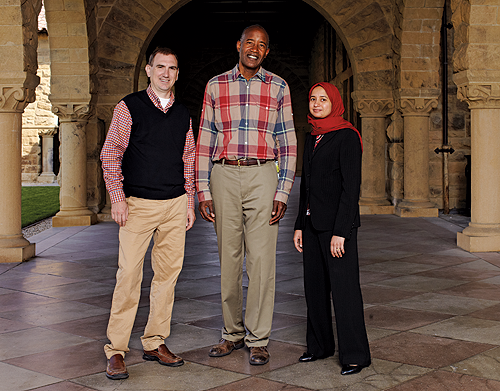New Faculty: Shirin Sinnar
Shirin Sinnar, JD ’03
Assistant Professor of Law
Shirin Sinnar, JD ’03, didn’t have far to go when she was appointed assistant professor of law this spring and moved into the William H. Neukom Building. As a Stanford Law Fellow, her basement office in the law school’s administrative building had been her home base from 2009 to 2012, during which time she taught Legal Research and Writing and followed what turned out to be a very short and direct path to the ivory tower.

Sinnar grew up in Maryland, the daughter of Muslim Indian immigrants who placed a high value on education. Her father is an engineer and her mother is a pediatrician. “I guess you could say they successfully pursued the ‘American dream,’” Sinnar observes. Likewise, Sinnar pursued her version of the dream, earning a BA in history from Harvard University, summa cum laude, in 1998 and an MPhil degree in international relations from Cambridge University in 1999, before entering Stanford Law School in 2001.
“When I graduated from college, I thought I would be a history professor,” she says, “but I realized that I first wanted to pursue hands-on social justice advocacy, especially in the area of international human rights. Law seemed like the better choice.” But the events of September 11, 2001, caused Sinnar to focus her advocacy in a very different direction.
“That same evening,” she says, “I found myself at a meeting of Muslim community leaders in the Bay Area, struggling to respond to the horrific attacks and the backlash that was sure to come.”
As a second-year law student, Sinnar was the only one in the room with any legal background. “I quickly realized,” she says, “how desperately my community needed to connect with civil rights advocates.”
Two weeks later, Sinnar co-founded the Bay Area Association of Muslim Lawyers to serve “as a bridge between lawyers and a community reeling from hate crimes, government roundups, and discrimination.”
Sinnar, who later served as the association’s first president, organized civil rights training for Muslim community leaders and “know your rights” presentations at local mosques. “I also answered phone calls from community members about workplace discrimination or detained family members and directed the callers to organizations that could help,” she adds.
After months of volunteering with the association, Sinnar says, “I realized that, although I had intended to pursue a career in international human rights, the civil rights crisis facing my community had led me to focus on the persistent challenges closer to home.”
Following law school graduation in 2003 and a clerkship with senior Judge Warren J. Ferguson of the U.S. Court of Appeals for the Ninth Circuit, Sinnar resumed her civil rights advocacy as an Equal Justice Works Fellow and attorney for the Lawyers’ Committee for Civil Rights Under Law in San Francisco. There she pursued post-9/11 backlash discrimination claims against employers, landlords, and other businesses and wrote the first detailed report of the civil rights issues arising from (mis)use of the Treasury Department’s “terrorist watchlist.”
. . . . . . . . . . . . . . . .
IN 2006, SINNAR JOINED THE ASIAN LAW CAUCUS as a staff attorney, where she continued to tackle civil rights issues facing immigrant communities. In that role, she says, “I became aware that many people were facing repeated and intrusive questions and searches by the U.S. Customs and Border Protection when they returned to the United States after traveling abroad.” That led Sinnar to launch a campaign against racial and religious profiling at U.S. borders, which in turn led to litigation against the Department of Homeland Security to obtain policies on border profiling and to her authorship of an in-depth report on discriminatory border interrogation released by the Stanford Immigrants’ Rights Clinic and the Asian Law Caucus.
Although Sinnar greatly enjoyed her civil rights work, she has a strong interest in scholarship and always thought she might enter the academy. “Academia offers the unparalleled opportunity to be deeply reflective and independent-minded about the problems you care about,” she says.
Becoming a Stanford Law Fellow in 2009 allowed her to make a nearly seamless transition to academia, as she leveraged her practice into an academic specialty. While a fellow, Sinnar developed her research agenda, which draws heavily on her experience as a post-9/11 civil rights lawyer and explores the non-judicial mechanisms for protecting individual rights in the national security context.
“Litigation is sometimes a poor fit to resolve civil rights issues, particularly in the national security area,” Sinnar explains. “As an academic, I hope to reflect on the possible alternative structures that can protect liberty and equality interests that may be compromised by national security policies.”
Sinnar will teach a seminar on Counterterrorism and the Law next spring and Civil Procedure in fall 2013.
